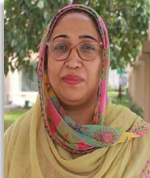Dr. Noreen Latief
Assistant Professor
National Centre of Excellence in Molecular Biology
PhD (Molecular Biology) (Pb.)

Dr. Noreen initially joined the Center of Excellence in Molecular Biology (CEMB) as a Ph.D. scholar, where she pursued her doctoral studies. After successfully completing her Ph.D. degree, she joined her alma mater as an Assistant Professor in the Stem Cells Regenerative Lab. Her research endeavors are primarily centered around the ambitious objective of organ regeneration, aiming to achieve this without the necessity of organ transplantation. Dr. Latief’s focus primarily lies in the utilization of Mesenchymal Stem Cells (MSCs) as a personalized medicine approach. Through her work, she aspires to contribute to the advancement of regenerative medicine by exploring novel strategies for organ regeneration, ultimately enhancing the quality of life for individuals affected by these challenging health issues. In pursuit of her research goals, she has chosen to address prevalent and impactful medical conditions, such as osteoarthritis and spinal cord injuries. The research group is strategically harnessing the regenerative potential of stem cells derived from various sources like Umbilical cord and adipose tissue to address the disease conditions. The primary goal here is to reinforce crucial cellular functions such as paracrine signaling, homing capability, survival mechanisms, and chemotaxis responses. This intricate modulation becomes particularly vital in the context of the demanding oxidative stress environments inherent to the targeted disease conditions. To maximize the therapeutic impact of these interventions, the research group adopts a multifaceted approach. Stem cells are subjected to precise modulation through priming techniques, complemented by the infusion of antioxidants and phytoextracts and are seamlessly integrated with cutting-edge components like amniotic membrane, silk scaffolds and nano particles. Dr. Noreen has international publications in esteemed journals, underscoring her significant contributions to the academic and scientific community. Additionally, her achievements include securing grants from the Higher Education Commission (HEC), further highlighting her dedication to advancing research and innovation. Her vision encompasses the translation of fundamental research into tangible clinical applications, ultimately contributing to the betterment of society.
|
||||||||||||||||||||||||||||||||||||||
|
PhD (Molecular Biology) (Pb.)
Phone Number: 92-42-35293141-46
E-mail Address: noreen.latief@cemb.edu.pk
National Centre of Excellence in Molecular Biology
|
||||||||||||||||||||||||||||||||||||||
